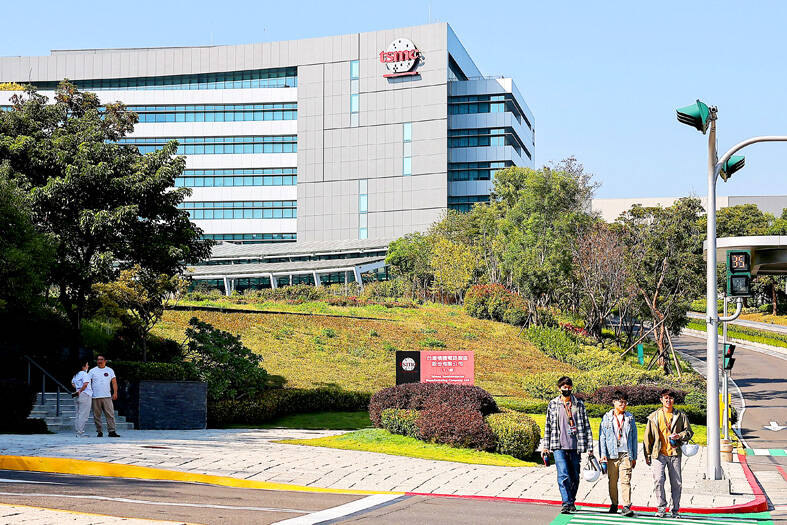Taiwan Semiconductor Manufacturing Co (TSMC, 台積電) retained the No. 1 title in the global pure-play wafer foundry business in the third quarter of this year, seeing its market share growing to 64.9 percent to leave South Korea’s Samsung Electronics Co, the No. 2 supplier, further behind, Taipei-based TrendForce Corp (集邦科技) said in a report.
TSMC posted US$23.53 billion in sales in the July-September period, up 13.0 percent from a quarter earlier, which boosted its market share to 64.9 percent, up from 62.3 percent in the second quarter, the report issued on Monday last week showed.
TSMC benefited from the debut of flagship smartphone products, as well as strong demand for high-performance computing (HPC) devices, which helped it report an increase in revenue in the third quarter, the report said.

Photo: REUTERS/Ann Wang
The chipmaker also saw an increase in production capacity utilization and wafer shipments, it said.
On the other hand, Samsung, with its clients’ products approaching the end of the life cycle and the company facing rising competition in mature processes from Chinese rivals, posted US$3.36 billion in sales in the third quarter, down 12.4 percent from a quarter earlier, the report said.
Despite retaining the No. 2 position, Samsung’s market share fell to 9.3 percent in the third quarter, down from 11.5 percent in the second quarter, leaving it further behind TSMC, according to TrendForce.
In the third quarter, the aggregate sales of the world’s top pure-play wafer foundry operators stood at about US$34.9 billion, up 9.1 percent from a quarter earlier and breaking the record set during the COVID-19 pandemic, the report said.
TrendForce attributed part of the growth to the substantial contributions from the advanced 3-nanometer (nm) process.
China’s Semiconductor Manufacturing International Corp (中芯) came in third place after posting US$2.17 billion in revenue in the third quarter and a market share of 6.0 percent, ahead of Taiwan’s United Microelectronics Corp (聯電) with US$1.87 billion in revenue and a 5.2 percent market share, and US-based GlobalFoundries Inc with US$1.74 billion in revenue and a 4.8 percent market share, the report showed.
China’s Huahong Group (華虹) took the sixth spot after generating US$799 million in revenue in the third quarter and securing a 2.2 percent market share.
It was followed by Israel’s Tower Semiconductor Ltd with US$371 million, or 1 percent, Taiwan’s Vanguard International Semiconductor Corp (世界先進) with US$366 million, or 1 percent, Taiwan’s Powerchip Semiconductor Manufacturing Corp (力積電) with US$336 million, or 0.9 percent, and China’s NexChip Co (晶合集成) with US$332 million, or 0.9 percent, the report added.
TrendForce said robust global demand for emerging technologies is expected to boost sales of the world’s top 10 pure-play wafer foundry operators in the fourth quarter, with a tight supply in sophisticated 5nm and 3nm processes expected to fail to meet solid demand.
However, demand for mature processes, which refers to the 28nm and lower-end technologies, would see little change or rise slightly in the fourth quarter, TrendForce said.

UNCERTAINTY: Innolux activated a stringent supply chain management mechanism, as it did during the COVID-19 pandemic, to ensure optimal inventory levels for customers Flat-panel display makers AUO Corp (友達) and Innolux Corp (群創) yesterday said that about 12 to 20 percent of their display business is at risk of potential US tariffs and that they would relocate production or shipment destinations to mitigate the levies’ effects. US tariffs would have a direct impact of US$200 million on AUO’s revenue, company chairman Paul Peng (彭雙浪) told reporters on the sidelines of the Touch Taiwan trade show in Taipei yesterday. That would make up about 12 percent of the company’s overall revenue. To cope with the tariff uncertainty, AUO plans to allocate its production to manufacturing facilities in

Taiwan will prioritize the development of silicon photonics by taking advantage of its strength in the semiconductor industry to build another shield to protect the local economy, National Development Council (NDC) Minister Paul Liu (劉鏡清) said yesterday. Speaking at a meeting of the legislature’s Economics Committee, Liu said Taiwan already has the artificial intelligence (AI) industry as a shield, after the semiconductor industry, to safeguard the country, and is looking at new unique fields to build more economic shields. While Taiwan will further strengthen its existing shields, over the longer term, the country is determined to focus on such potential segments as

TAKING STOCK: A Taiwanese cookware firm in Vietnam urged customers to assess inventory or place orders early so shipments can reach the US while tariffs are paused Taiwanese businesses in Vietnam are exploring alternatives after the White House imposed a 46 percent import duty on Vietnamese goods, following US President Donald Trump’s announcement of “reciprocal” tariffs on the US’ trading partners. Lo Shih-liang (羅世良), chairman of Brico Industry Co (裕茂工業), a Taiwanese company that manufactures cast iron cookware and stove components in Vietnam, said that more than 40 percent of his business was tied to the US market, describing the constant US policy shifts as an emotional roller coaster. “I work during the day and stay up all night watching the news. I’ve been following US news until 3am

COLLABORATION: Given Taiwan’s key position in global supply chains, the US firm is discussing strategies with local partners and clients to deal with global uncertainties Advanced Micro Devices Inc (AMD) yesterday said it is meeting with local ecosystem partners, including Taiwan Semiconductor Manufacturing Co (TSMC, 台積電), to discuss strategies, including long-term manufacturing, to navigate uncertainties such as US tariffs, as Taiwan occupies an important position in global supply chains. AMD chief executive officer Lisa Su (蘇姿丰) told reporters that Taiwan is an important part of the chip designer’s ecosystem and she is discussing with partners and customers in Taiwan to forge strong collaborations on different areas during this critical period. AMD has just become the first artificial-intelligence (AI) server chip customer of TSMC to utilize its advanced